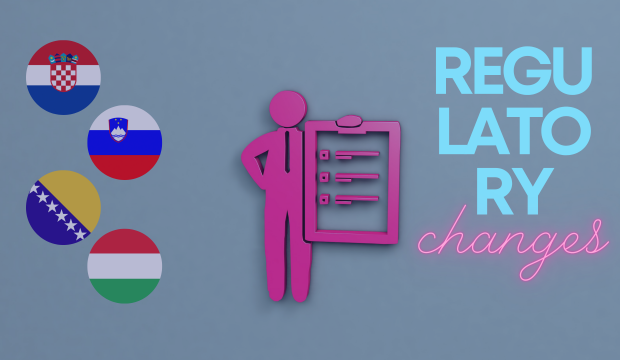

Amendments to the Enforcement Act – On November 20thThe Croatian Parliament passed amendments to the Enforcement Act according to which the costs of enforcement proceedings are reduced, electronic communication is introduced, and Christmas, Easter, recourse and hot meals are exempted from enforcement. Trade union loans, field allowance, maritime allowance, reserve fee, student awards and sports scholarships for athletes with disabilities will be exempted from enforcement. According to the legal changes, evictions will not be carried out from November 1st 2020 to April 1st 2021, and the amount of principal for which enforcement over real estate cannot be initiated from HRK 20,000 to HRK 40,000 will also be increased. Also, it is a novelty that in the circumstances of the epidemic caused by COVID-19, the Government will be able to make a decision to stop enforcement proceedings for a maximum of 6 months.
The Law on Foreign Nationals – The Croatian Parliament passed the new Law on Foreign Nationals, which will no longer determine the annual quota for the employment of foreigners, and which more clearly prescribes the provisions related to the entry, stay and work of foreigners in Croatia. According to the new Law, the Government will no longer decide on the annual quota of employment permits for foreigners, but employers will be obliged to ask the Croatian Employment Service to conduct a labour market test before applying for a residence and work permit for foreigners. If it is determined that there are no unemployed persons in the Republic of Croatia who meet the requirements of employers, employers will then apply for a residence and work permit to the Ministry of the Interior, which will ex officio ask the Croatian Employment Service for an opinion on hiring a specific foreigner with a Croatian employer. The procedure for issuing residence and work permits, including the implementation of the labour market test, before the competent authorities will take a maximum of 30 days. The Act also prescribes exceptions to the implementation of the labour market test related to deficient occupations such as carpenters, masons, waiters, butchers and in the case of seasonal work up to 90 days in agriculture, forestry, catering and tourism.
Under the new Law, a new institute of long-term visa, the so-called D visa, is introduced in the event that a third-country national is granted temporary residence due to work, family reunification, study, research and secondary education. The new Law on Foreign Nationals will enter into force on January 1st, 2021.
Safety at Work Law of Federation of Bosnia and Herzegovina – The new law especially affects the following: prevention of injuries at work, professional diseases and other diseases related to work, especially the protection of women in connection with motherhood, young people, persons with disabilities and occupationally ill persons from further damage to health and reduction of working ability, preservation of working ability of older workers within the limits appropriate to their age, as well as environmental protection. The law introduced new institutes, as follows: Council for Occupational Safety – established by the Government of FBiH, and consists of representatives of the Government of FBiH, employers’ associations, trade unions and prominent experts for safety and health of workers; Occupational Safety and Health Commissioner – who is elected or appointed by an employer who employs 30 or more workers; Occupational safety worker – determined by the employer with whom there are jobs with increased risk, and who performs tasks related to risk prevention and protection of workers’ health.
The Supreme Court Decree on special measures referred to in Article 83a of the Courts Act – The Supreme Court ordered special measures referred to in Article 83a of the Courts Act due to the declared epidemic of the infectious disease COVID-19 in the territory of the Republic of Slovenia. As of 16th November 2020, all courts are operating to a limited extent due to stricter measures to prevent the spread of the new coronavirus and will hold hearings only in urgent cases. All hearings in non-urgent matters were cancelled by order of the President of the Supreme Court, unless convened by videoconference. The courts will operate to a limited extent until revoked. During this time, procedural deadlines for non-urgent matters do not run. The running of procedural deadlines in enforcement cases has been stopped, but the running of deadlines in insolvency cases has not been stopped. The running of material deadlines in court procedures stopped on 20th of November until 19th of December.
Act on Transitional Measures for Stabilizing the Situation of Special Social Groups and Enterprises in Financial Difficulties (“Moratorium Act II”) – The Moratorium Act II provides for a moratorium on payments to debtors belonging to priority social groups, and establishes a prohibition on loan cancellation from 1 January 2021 to 30 June 2021 on credit and loan agreements outstanding on 18 March 2020. The payment moratorium will run from January 1, 2021 to June 30, 2021. Priority social groups entitled to a payment moratorium are: unemployed persons who are jobseekers, parents expecting or raising a child, pensioners and public employees. Also, the payment moratorium and the ban on loan cancellation only apply to loans already disbursed under the Contracts in force on 18 March 2020.